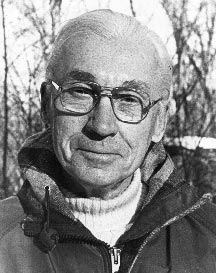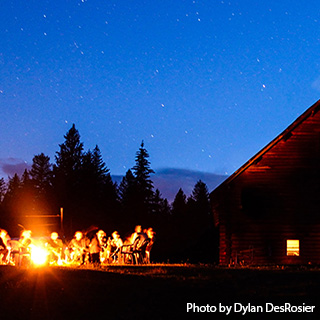Arnold Bolle
 Born in Watertown, Wisconsin on October 5, 1912, Arnold W. Bolle was educated at Northwestern College in Watertown (1934), the University of Montana (B.S. Forestry, 1937) and Harvard University (master's in forestry, 1955 and Ph.D. Public Administration, 1960). While a student at Montana, Arnie met another UM student, Helen Swan. Upon graduation in 1937, and the receipt of his first paycheck from the Sunnyside Ranger Station, Helen and Arnie were married.
Born in Watertown, Wisconsin on October 5, 1912, Arnold W. Bolle was educated at Northwestern College in Watertown (1934), the University of Montana (B.S. Forestry, 1937) and Harvard University (master's in forestry, 1955 and Ph.D. Public Administration, 1960). While a student at Montana, Arnie met another UM student, Helen Swan. Upon graduation in 1937, and the receipt of his first paycheck from the Sunnyside Ranger Station, Helen and Arnie were married.
After working for the U.S. Forest Service, the Soil Conservation Service and managing a dude ranch in Wyoming, Arnie joined the faculty of the University of Montana School of Forestry in 1954 to teach forest economics and natural resource policy.
During the early part of Arnie's career, he became an expert on the regional wood products industry and multiple-use forest management. Like most forestry faculty and researchers, he recognized the unique government-industry relationships that dominated forestry programs and affairs. Arnie recognized that the public and political processes would become increasingly central to all public lands and environmental issues.
In 1962, Arnie was appointed Dean of the School of Forestry and Director of the Montana Forest and Conservation Experiment Station. During the 10 years he held the job of dean, the school grew in size and excellence. Arnie brought attention to the public lands management controversies that sprang from the growing environmental concerns of the American public to the school.
Residents of Montana's Bitterroot Valley voiced their concerns about forest practices to then United States Senator Lee Metcalf. They were particularly concerned by clearcutting, terracing the mountainsides and forest road design and construction. Senator Metcalf asked Dean Bolle to appoint a faculty study team to investigate the public concerns and to write a report to him. The report, A University View of the Forest Service, subsequently became popularly known as the Bolle Report. Upon receiving the report, Senator Metcalf elected to publish it as a Senate Document. Over 100,000 copies were printed and distributed and the report started a national forest land management controversy.
Arnie had a lifelong commitment to improving the quality of forest and rangeland management. Wilderness protection was one of the cornerstones of that philosophy and commitment. He transferred his vision for a conservation ethic to many young people throughout the country. He played key roles in national, international, regional and local conservation organizations and was able to share his wisdom and vision through his participation and leadership in these organizations. Arnie was a trusted advisor to students and senators, staffers and supporters. The foundation for his vision and the source of his strength was based on his love for nature and people.
On Valentine's day, 1994, Liz Claiborne and Art Ortenberg donated a major gift to the University of Montana Foundation to enable the formation of the Bolle Center for People and Forests.
